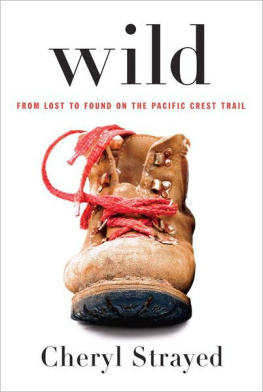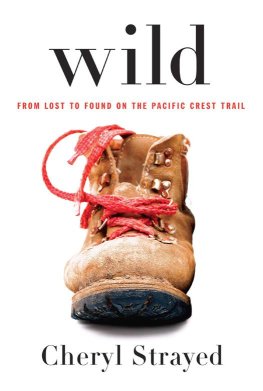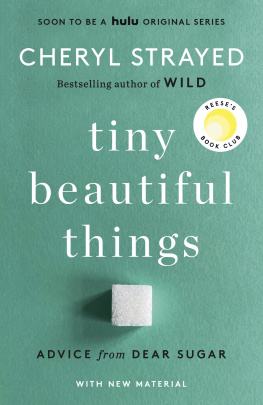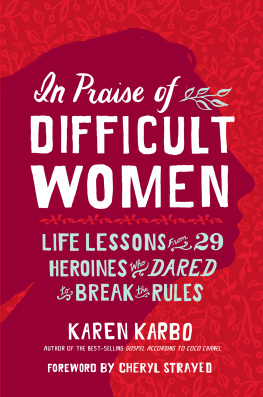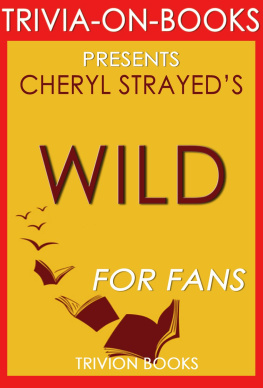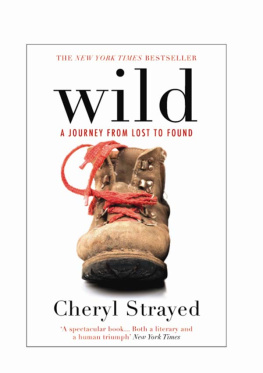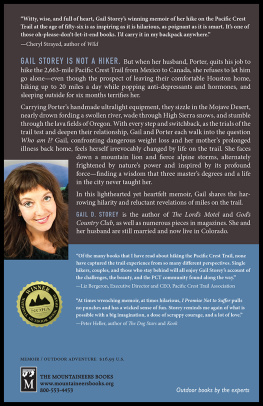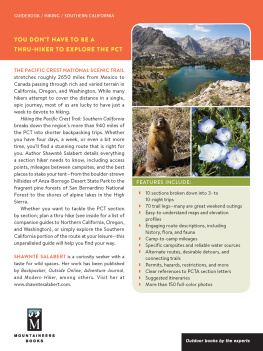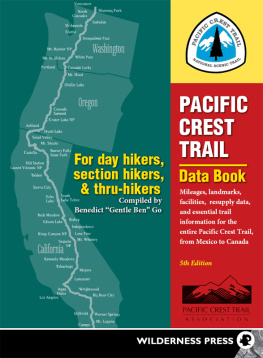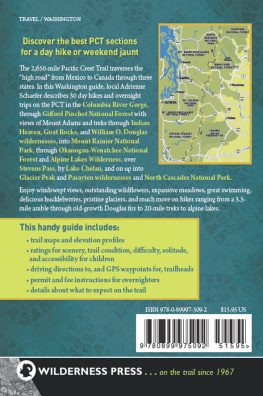ACKNOWLEDGMENTS
Miigwech is an Ojibwe word I often heard growing up in northern Minnesota, and I feel compelled to use it here. It means thank you, but moreits meaning imbued with humility as well as gratitude. Thats how I feel when I think about trying to thank all of the people who helped me make this book: humbled as well as grateful.
It is to my husband, Brian Lindstrom, that I owe my deepest miigwech, for he has loved me beyond measure, in both my writing and my life. Thank you, Brian.
Im indebted to the Oregon Arts Commission, the Regional Arts and Culture Council, and Literary Arts for providing me with funding and support while I wrote this book and also throughout my career; to Greg Netzer and Larry Colton of the Wordstock Festival for always inviting me to the show; and to the Bread Loaf Writers Conference and the Sewanee Writers Conference for giving me meaningful support along the way.
I wrote most of this book while sitting at my dining room table, but crucial chapters were written away from home. Im grateful to Soapstone for the residencies they provided me, and especially to Ruth Gundle, the former director of Soapstone, who was particularly generous to me in the early stages of this book. A profound thank you to Sally and Con Fitzgerald, who hosted me so graciously while I wrote the final chapters of Wild in their beautiful, silent wee house in Oregons Warner Valley. Thanks also to the incomparable Jane OKeefe, who made my time in the Warner Valley possible, and both loaned me her car and did my grocery shopping.
Thank you to my agent, Janet Silver, and also to her colleagues at the Zachary Shuster Harmsworth Agency. Janet, you are my friend, champion, and literary kindred spirit. I will always be grateful to you for your support, smarts, and love.
Im indebted to the many people at Knopf who believed in Wild back in the early stages and have worked to bring it into the world. Im especially grateful to my editor, Robin Desser, who never stopped pushing me to make this the best book it could be. Thank you, Robin, for your intelligence and your kindness, for your generous spirit and your incredibly long, single-spaced letters. Without you, this book wouldnt be what it is. Thanks also: Gabrielle Brooks, Erinn Hartman, Sarah Rothbard, Susanna Sturgis, and LuAnn Walther.
A deep bow to my children, Carver and Bobbi Lindstrom, who endured with grace and good humor all those times I had to go off alone to write. They never let me forget that life and love matter most.
Thanks also to my stellar writers group: Chelsea Cain, Monica Drake, Diana Page Jordan, Erin Leonard, Chuck Palahniuk, Suzy Vitello Soul, Mary Wysong-Haeri, and Lidia Yuknavitch. Im indebted to each of you for your wise counsel, honest feedback, and killer pinot noir.
Im deeply grateful to the friends who have nurtured and loved me. There are too many to name. I can only say you know who you are and Im so fortunate youre in my life. There are some people Id like to thank in particular, howeverthose who helped me in specific and numerous ways as I wrote this book: Sarah Berry, Ellen Urbani, Margaret Malone, Brian Padian, Laurie Fox, Bridgette Walsh, Chris Lowenstein, Sarah Hart, Garth Stein, Aimee Hurt, Tyler Roadie, and Hope Edelman. Im humbled by your friendship and kindness. Thanks also to Arthur Rickydoc Flowers, George Saunders, Mary Caponegro, and Paulette Bates Alden, whose early mentorship and endless goodwill has meant the world to me.
Thank you to Wilderness Press for publishing the guidebooks that were and still are the definitive texts for those hiking the Pacific Crest Trail. Without the guidebooks authors Jeffrey P. Schaffer, Ben Schifrin, Thomas Winnett, Ruby Jenkins, and Andy Selters, Id have been utterly lost.
Most of the people I met on the PCT passed only briefly through my life, but I was enriched by each of them. They made me laugh, they made me think, they made me go on another day, and most of all, they made me trust entirely in the kindness of strangers. I am particularly indebted to my fellow 1995 PCT alumni CJ McClellan, Rick Topinka, Catherine Guthrie, and Joshua OBrien, who responded to my inquiries with thoughtful care.
Lastly, I would like to remember my friend Doug Wisor, whom I wrote about in this book. He died on October 16, 2004, at the age of thirty-one. He was a good man who crossed the river too soon.
Miigwech.
ALSO BY CHERYL STRAYED
Torch
ABOUT THE AUTHOR
Cheryl Strayed is the author of the critically acclaimed novel Torch, which was a finalist for the Great Lakes Book Award and was selected by The Oregonian as one of the top ten books of 2006 by Pacific Northwest authors. Her stories and essays have appeared in numerous magazines and journals, including The New York Times Magazine, The Washington Post Magazine, Allure, The Rumpus, Self, The Missouri Review, and The Sun. Her essays have been included in the Pushcart Prize anthology and twice in The Best American Essays. She lives in Portland, Oregon.
Cheryl Strayed is available for select readings and lectures. To inquire about a possible appearance, please contact the Random House Speakers Bureau at .
BOOKS BURNED ON THE PCT
The Pacific Crest Trail, Volume 1: California, Jeffrey P. Schaffer,
Thomas Winnett, Ben Schifrin, and Ruby Jenkins. Fourth edition,
Wilderness Press, January 1989.
Staying Found: The Complete Map and Compass Handbook, June Fleming.
The Dream of a Common Language, Adrienne Rich.
As I Lay Dying, William Faulkner.
The Complete Stories, Flannery OConnor.
The Novel, James Michener.
A Summer Bird-Cage, Margaret Drabble.
Lolita, Vladimir Nabokov.
Dubliners, James Joyce.
Waiting for the Barbarians, J. M. Coetzee.
The Pacific Crest Trail, Volume 2: Oregon and Washington, Jeffrey P. Schaffer and Andy Selters. Fifth edition, Wilderness Press, May 1992.
The Best American Essays 1991, edited by Robert Atwan and
Joyce Carol Oates.
The Ten Thousand Things, Maria Dermot.
Not burned. Carried all the way.
Not burned. Traded for The Novel.
Wild
By Cheryl Strayed
Reading Group Guide
ABOUT THIS READING GROUP GUIDE
The questions, discussion topics, and reading list that follow are intended to enhance your reading groups discussion of Wild, Cheryl Strayeds powerful, blazingly honest memoir: the story of an eleven-hundred-mile solo hike that broke down a young woman reeling from catastropheand built her back up again.
ABOUT THE BOOK
Cheryl Strayed reminds us, in her lyrical and courageous memoir Wild, of what it means to be fully alive, even in the face of catastrophe, physical and psychic hardship, and loss. Mira Bartk, author of The Memory Palace
Stunning An incredible journey, both inward and outward. Garth Stein, author of The Art of Racing in the Rain
At twenty-two, Cheryl Strayed thought she had lost everything. In the wake of her mothers death, her family scattered and her own marriage was soon destroyed. Four years later, with nothing more to lose, she made the most impulsive decision of her life: to hike the Pacific Crest Trail from the Mojave Desert through California and Oregon to Washington Stateand to do it alone. She had no experience as a long-distance hiker, and the trail was little more than an idea, vague and outlandish and full of promise. But it was a promise of piecing back together a life that had come undone.
Strayed faces down rattlesnakes and black bears, intense heat and record snowfalls, and both the beauty and loneliness of the trail. Told with great suspense and style, sparkling with warmth and humor,

